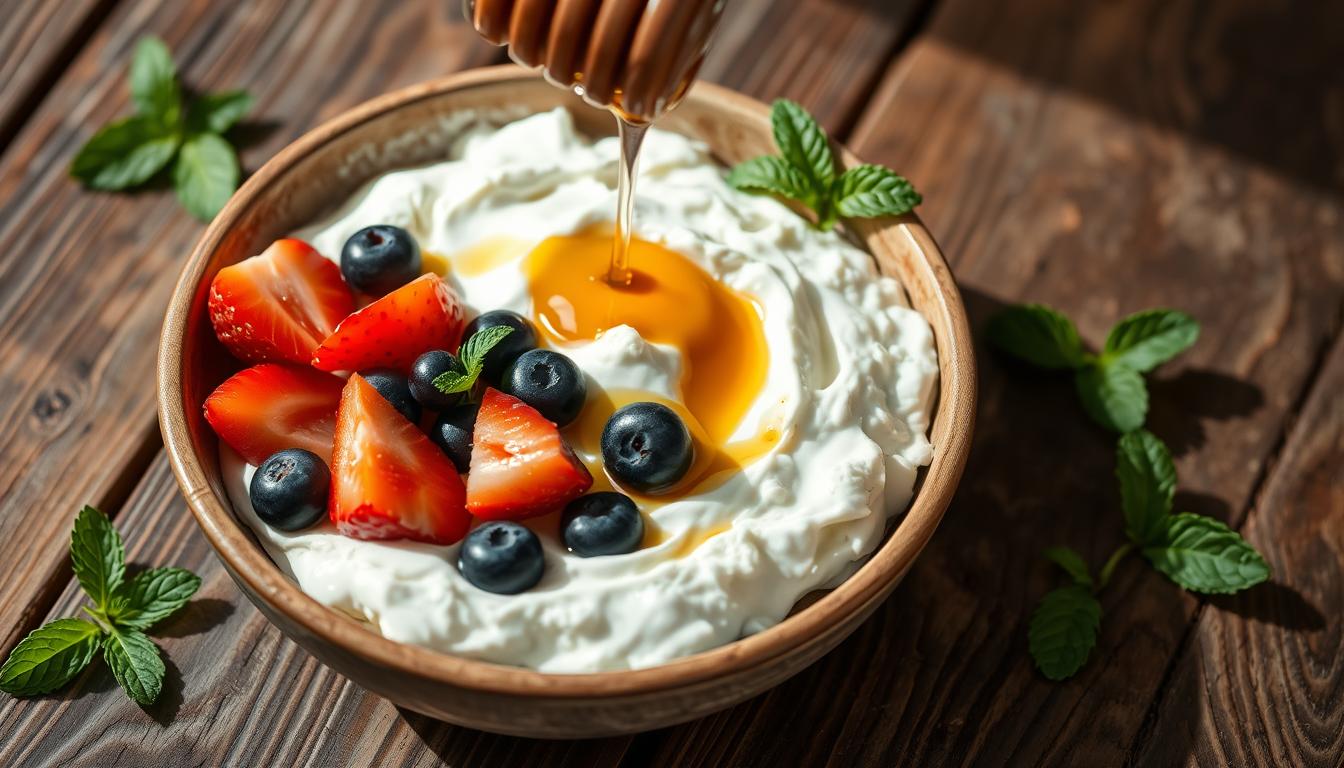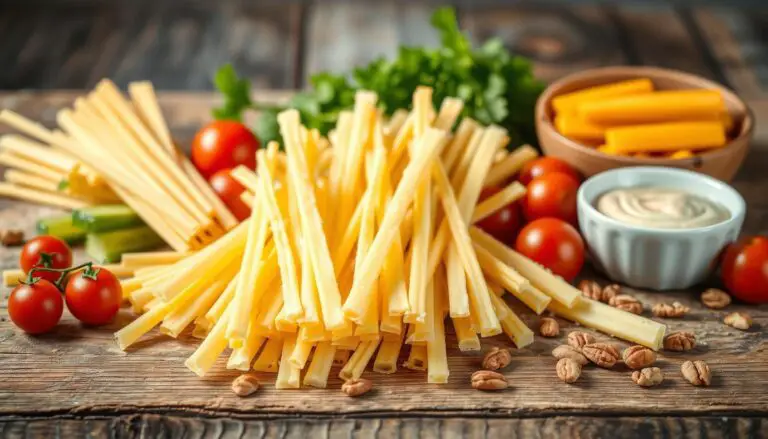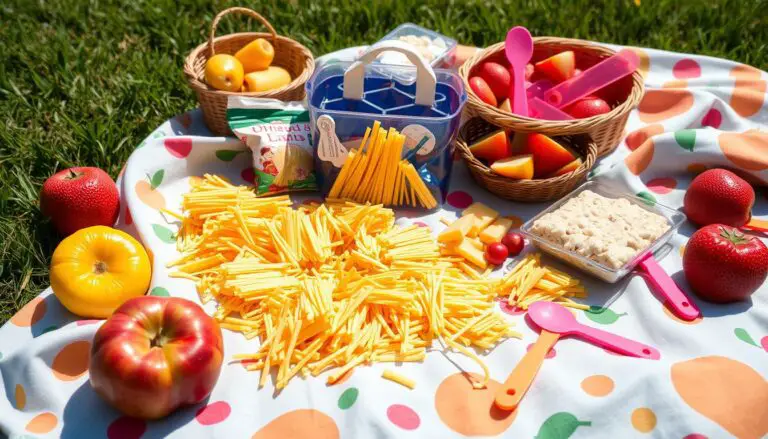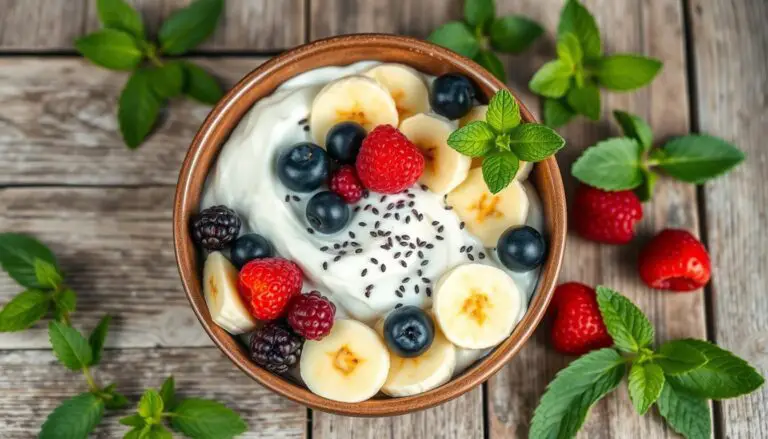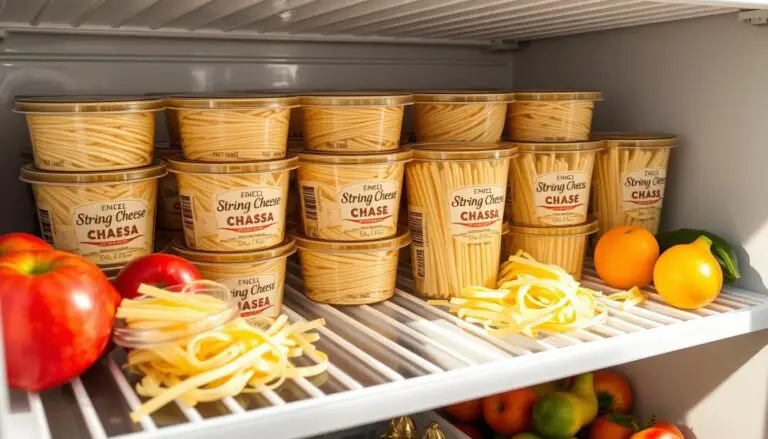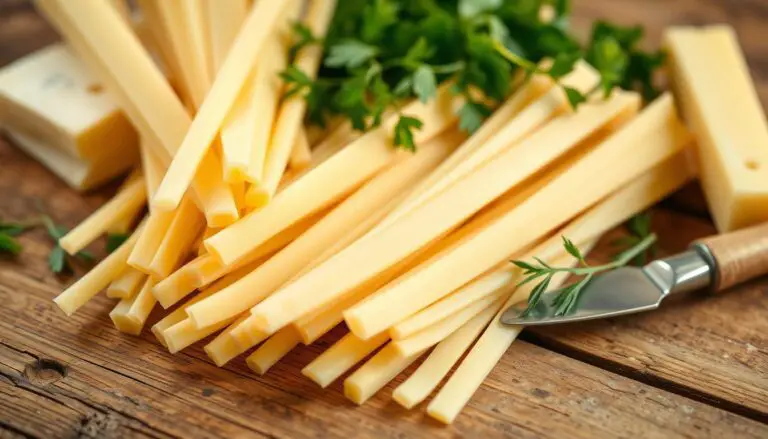Is Cottage Cheese Good to Eat by Itself? Find Out!
Cottage cheese is becoming more popular as a healthy food choice. But, is it good to eat by itself? This article explores cottage cheese’s nutritional value and health benefits. It answers if it’s a good snack option.
Known for being high in protein, cottage cheese is also low in calories. It’s great for a balanced diet. This makes it a good choice for those looking to add healthy snacks to their diet. You can find more about it on BBC Viral. It helps you make better snack choices1.
Key Takeaways
- Cottage cheese is high in protein, making it an excellent choice for those looking to increase protein intake.
- With about 100 calories per cup, it is a low-calorie option ideal for weight loss.
- Cottage cheese provides vital nutrients such as calcium and Vitamin B12, essential for bone health and nerve function.
- It can be enjoyed on its own or used in various dishes, enhancing both sweet and savory flavors.
- The creamy texture of cottage cheese serves as a satisfying standalone snack.
Introduction to Cottage Cheese
Cottage cheese has become a favorite in many kitchens, moving past its ’90s diet fad days. It’s made from curdled milk and packed with about 25g of protein per cup2. It also has only 11g of carbs, with most of that being natural sugars from milk2. This makes it a great choice for those looking for healthy snacks.
Thanks to social media, like TikTok, cottage cheese recipes are getting more attention. It’s not just about the protein, which helps you feel full and build muscle. It’s also rich in potassium and calcium2. Plus, it has probiotics, which are good for your gut health, although not all types have a lot of them3.
Plain cottage cheese is also good for keeping blood sugar levels stable. This is because it has lots of protein and not much sugar3. So, it’s a great pick for anyone wanting to eat better.
What is Cottage Cheese?
Cottage cheese is a special kind of cheese made by curdling milk. It has a creamy yet lumpy texture. This makes it different from other cheeses.
Many people like cottage cheese because it’s high in protein and low in calories. It comes in different fat levels, from low-fat to full-fat. This makes it a great choice for those who want a healthier option.
A 100g serving of low-fat cottage cheese has 72 calories and 12g of protein. This is about 30% of what we need daily. Full-fat versions have about 105 calories per 100g4.
Cottage cheese is similar to ricotta and mozzarella, coming from curdled milk. Its unique texture and taste make it great in many dishes. It’s perfect for smoothies or pasta5.
It’s also packed with nutrients like vitamin B12, calcium, and potassium6. This makes it a nutritious choice for your diet.
Is Cottage Cheese Good to Eat by Itself?
Cottage cheese is known for its versatility in many dishes. Many ask, is cottage cheese good to eat alone? The answer is yes. It’s a nutritious snack that’s both tasty and easy to enjoy.
Cottage Cheese as a Standalone Snack
A 1-cup serving of low-fat cottage cheese has about 28 grams of protein. This makes it a great choice for those wanting more protein7. With 183 calories per cup, it’s also good for diets focused on weight loss or management7.
The creaminess of cottage cheese is comforting, like yogurt but with a unique taste. Enjoying it plain, you can add salt or pepper for flavor. Or, try it with fruit for a sweeter snack.
Flavor Profile of Cottage Cheese
The taste of cottage cheese can be mild to slightly tangy, perfect for different toppings. For savory lovers, add spices or herbs. Sweet fans might enjoy it with honey or berries.
A half-cup of cottage cheese has 12 to 15 grams of protein and 4 grams of carbs. It’s also low in carbs, making it good for ketogenic diets7. It’s packed with calcium, phosphorus, and vitamins, making it a healthy snack choice.
Cottage Cheese Nutritional Value
Cottage cheese is packed with nutrients, making it a great choice. One cup of full-fat cottage cheese has about 25.5 grams of protein. This makes it a top pick for protein-rich foods8. Low-fat cottage cheese has around 24.2 grams of protein per cup8.
It’s also low in calories, with full-fat versions having about 226.6 calories and low-fat options at 180 calories8. Full-fat cottage cheese has about 193.6 mg of calcium, while low-fat has around 227 mg per cup8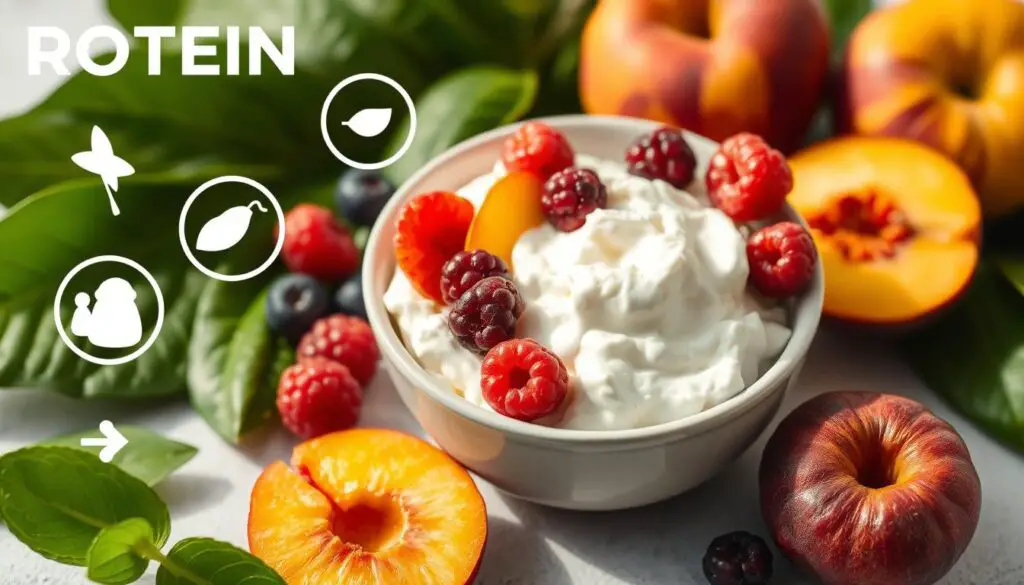
Cottage cheese is good for many diets because of its nutrient profile. A half-cup serving has about 14 grams of protein and 3 grams of carbs9. It also has about 80% of the daily calcium value9. Plus, it has essential vitamins and phosphorus, providing around 180 milligrams per serving9.
It also has only about 2.5 grams of lactose per serving, making it easy to digest for many9.
Cottage cheese is a great choice for those watching their calories but still want to get enough protein. Protein can help reduce hunger, which is good for weight management10. Adding cottage cheese to your meals can help you meet your protein needs and support your health goals.
Health Benefits of Cottage Cheese
Cottage cheese is loved for its creamy texture and health benefits. It’s packed with protein and important nutrients. Just half a cup is low in calories but full of good stuff.
High Protein Content
Cottage cheese is a hit with those who work out and diet. It has 12.4 grams of protein in just half a cup, more than Greek yogurt11. This helps keep you full and helps muscles heal. It’s also a complete protein, meaning it has all nine essential amino acids11.
This makes it great for anyone wanting to stay healthy and get enough protein.
Calcium and Vitamin B12 Sources
Cottage cheese is also rich in calcium and vitamin B12. These are key for strong bones and healthy nerves. Half a cup gives you 176 milligrams of calcium, or 9% of your daily needs11.
It also has 20% of your daily vitamin B12 needs, important for making red blood cells and brain function1112. These nutrients are especially good for people at risk of not getting enough.
| Nutrient | Amount per Half-Cup | Percentage of Daily Value (DV) |
|---|---|---|
| Calories | 93-81 | – |
| Protein | 12.4-14 grams | – |
| Calcium | 176 mg | 9% |
| Vitamin B12 | 0.5 mcg | 20% |
| Fat | 2.6 grams | – |
| Carbohydrates | 4.9 grams | – |
The mix of protein, calcium, and vitamin B12 makes cottage cheese a top choice for a healthy diet.
How to Incorporate Cottage Cheese into Your Diet
Adding cottage cheese to your meals is a tasty and healthy move. It’s great for many dishes, making it a top pick for diet-friendly foods. Try mixing it with fruits like berries or peaches for a tasty treat. A 4-ounce (1/2 cup) serving has about 14 grams of protein, perfect for healthy snacks13.
Cottage cheese can make any recipe better, adding both flavor and nutrition. Mixing it with eggs gives you 17 grams of protein per serving14. You can also swap it for ricotta in lasagna or mac and cheese, keeping the taste but adding more protein1415. Adding it to pancakes or muffins makes them healthier without losing flavor.
Using cottage cheese in smoothies is a great way to start your day with a protein-packed breakfast. You can also whip it with spices for a tasty dip. For a healthier meal, try it on baked potatoes or in salads. Its creamy texture and nutritional value make it a standout choice for any meal.
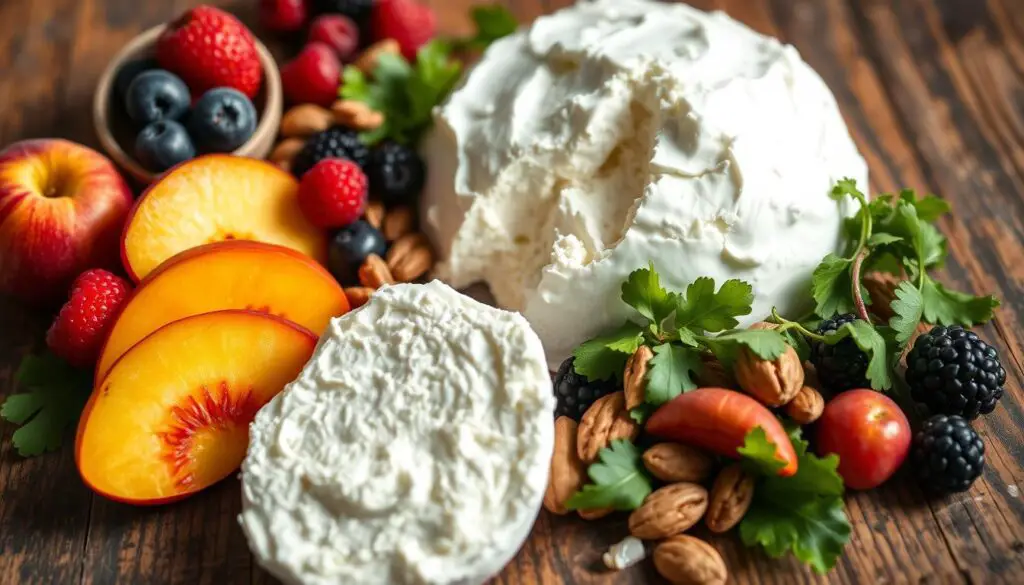
| Recipe | Cottage Cheese Role | Protein Content (grams) |
|---|---|---|
| Cottage Cheese Pancakes | Main ingredient for added protein | 14 |
| Lasagna | Substitute for ricotta | 23 |
| Cottage Cheese Smoothie | Base for high-protein blend | 13 |
| Cottage Cheese Zucchini Casserole | Provides creamy texture | 17 |
Creative Ways to Serve Cottage Cheese
Looking to make cottage cheese more exciting? There are many creative ways to serve it. These methods suit different tastes, making it a nutritious treat for all.
Topping with Fruits and Nuts
Try topping cottage cheese with fruits like strawberries, peaches, or blueberries. It adds sweetness and vitamins. Nuts like almonds or walnuts add crunch and flavor.
This mix of sweet and crunchy is great for breakfast or a snack. It’s a healthy choice that’s also tasty.
Mixing with Savory Ingredients
Mix cottage cheese with herbs and spices for a savory twist. It’s perfect for salads or toast toppings. Add diced cucumbers, tomatoes, or bell peppers for a refreshing summer dish.
With the right mix, cottage cheese becomes a tasty side or main dish. It complements your meal well.
These creative ways make cottage cheese more enjoyable. Whether you top it with fruits and nuts or mix it with savory ingredients, there’s something for everyone. It’s a great way to add variety to your meals16.
Conclusion
Cottage cheese is a food full of nutrients, making it great to eat alone or with other dishes. It has just 81 calories in half a cup and about 14 grams of protein. This makes it a good choice for those looking to eat healthy17.
It also has important vitamins and minerals like calcium and Vitamin B12. These help keep you healthy18.
Cottage cheese is easy to add to many meals, whether you eat it plain or with toppings. Adding it to your diet can make your meals tastier and more nutritious. It’s a great way to improve your health and manage your weight1718.
So, think about making cottage cheese a regular part of your meals. It can help you live a healthier life. Eating it alone or with other foods boosts your protein and nutrient intake, supporting your health17.

